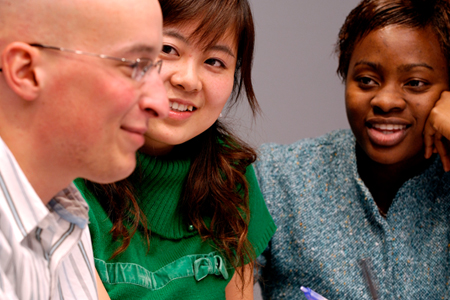Diversity Profile
Emerson College is an Equal Opportunity Employer. As such, it will not discriminate against any employee or applicant for employment on the basis of race, color, religion, age, sex, national origin, sexual orientation, gender identity, physical or mental handicap/disability, veteran status, ancestry, genetic information, or any other category protected by law.
This philosophy is practiced in, but not limited to, the following: employment, promotion, upgrading, demotion, transfer, position classification, recruitment or recruitment advertising, layoff or termination, rate of pay, benefits or other compensation, and/or selection for training. All employment decisions at the College are based on merit, qualifications and abilities.
Any employee or applicant for employment who has questions about this policy or its implementation within the College is encouraged to contact Human Resources.
Office of Diversity and Inclusion
Emerson College
8 Park Plaza, 2nd Floor
Boston, MA 02116
diversity_inclusion@emerson.edu
Phone: 617-824-8528
Twitter: @ECDiversity
Vision
Emerson College will be known as the leading institution for inclusive excellence among our peers in the arts and communication. 
Mission
The Office of Diversity and Inclusion provides strategic leadership for Emerson College’s work on diversity and inclusion. Utilizing an inclusive excellence framework, the Office of Diversity and Inclusion facilitates goal setting and the development of related actions that will fully integrate inclusive practices into the life of the institution.
“Making excellence inclusive is a call to action for educators who believe that high-quality, practical liberal education should be the standard of excellence for all students. It is a framework for educators to resist and reverse historical standards of inclusion and excellence. The intended outcome is that colleges and universities integrate diversity, inclusion, equity, and educational quality efforts into their missions and operations on an institutional level, leading to excellence in learning for all students.” (AAC&U)
The Inclusive Excellence model is built upon the following principles (AAC&U):
- - Institutional excellence is not possible without full engagement with diversity. An excellent institution is an inclusive institution.
- - All students, faculty and staff should have the opportunity to succeed.
- - All members of our community, especially students, benefit educationally from participating in a community where people differ from one another. Diversity enhances the educational experience of students.
- - In order to be successful as citizens and workers, Emerson graduates must have the intercultural competence to live and work in a diverse world.
- - An inclusive community is characterized by mutual respect, a sense of belonging, and personal safety.
Utilizing an Inclusive Excellence model reflects the understanding that diversity and inclusion are catalysts for institutional change and the foundation for educational excellence. At Emerson not only do we seek to be excellent but we hope to move from excellent to extraordinary.
Diversity Strategic Plan
In 2007, a strategic plan for racial and ethnic diversity was developed. Its purpose was to identify specific steps to increase racial and ethnic diversity throughout the College. In 2008, Emerson set up its Diversity Council to oversee the College’s progress in attaining the goals set forth in the plan.
View the original plan and two annual updates.
- Diversity Strategic Plan (September 2008)
- Diversity Strategic Plan Annual Report (October 2010)
- Diversity Strategic Plan Annual Report (2011)
In 2012, Emerson hired a Vice President for Diversity and Inclusion who has refocused the College's efforts to bring diversity to an elevated level of inclusive excellence. The next reporting cycle will feature a revised Inclusive Excellence strategic plan that aligns more closely with President Lee Pelton's vision for the College.
In the fall of 2012, as part of his inaugural address, President Lee Pelton asserted that the College would redouble its commitment to diversity and inclusion. Within days of that address, he announced the launch of a new initiative for Inclusive Excellence at Emerson. Learn more about The Inclusive Excellence Initiative here.
Climate Survey Summaries - In November of 2009 Emerson College requested feedback from students, faculty, and staff with regard to perceptions of diversity at Emerson in the form of a campus climate survey. A total of 832 confidential responses were collected and analyzed. Across the three groups of respondents common themes emerged, suggesting areas where the College is perceived to be performing well and others where work needs to be done.
The Office of Diversity and Inclusion is committed to providing faculty with tools and resources necessary for excellence in teaching with regard to diversity and inclusion. Inclusive instructional practices can create a vibrant learning environment that allows students to thrive. Please see a list of these resources here.
The Office of Diversity and Inclusion offers a variety of programs and services designed to support the campus community in realizing institutional diversity and inclusion goals. In addition, the office supports the development and implementation of inclusive practices and works to increase the intercultural development of members of our community. A list of Program and Services can be found here.
In Spring 1988, Faculty Assembly established a special committee, the Racial Awareness Committee, to explore the status of racial awareness on the Emerson campus. 
In Fall 1994, the committee’s name was changed to PRISM, an acronym for Perspectives on Race, Identity, Sexuality, and Multiculturalism. Initially serving as a watchdog committee in response to student concerns about classroom insensitivity and racism (and an organization serving the needs of the small group of minority faculty), PRISM’s focus has expanded to include planning and producing conferences and other programs that promote faculty, staff, and student participation in multicultural events and understanding of (and engagement with) diversity issues.
At the same time, PRISM remains committed to the committee’s original mission of listening and responding to student, faculty, and staff concerns about all forms of prejudice when they arise at the College.
About Boston
Founded in 1630, Boston is one of the oldest and most picturesque cities in America and, arguably, the best college town in the country. 
An International Hub
As an international center for education, technology, finance, architecture, and medicine, Boston maintains its reputation as a world-class city. Boston’s numerous historic attractions, vibrant ethnic neighborhoods, upscale shops and restaurants, and proximity to beaches, mountains, and lakes make it one of the most popular tourist destinations in the United States. While nearly 4 million people live in the metropolitan area, Boston itself is a relatively small, manageable, and “walkable” city.
Learn more about Boston's cultural diversity, attractions, and accommodations and transportation.


